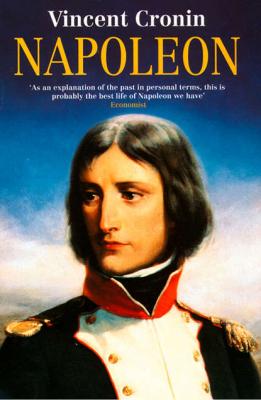ТОП просматриваемых книг сайта:
Napoleon. Vincent Cronin
Читать онлайн.Название Napoleon
Год выпуска 0
isbn 9780007394951
Автор произведения Vincent Cronin
Жанр Биографии и Мемуары
Издательство HarperCollins
NAPOLEON
Vincent Cronin
FOR
CHANTAL
Contents
25. A Hundred and Thirty-Six Days
APPENDIX A: Memoir-Writers and Napoleon
APPENDIX B: ‘Clisson et Eugénie’
WHEN Napoleon first set foot on the deck of an English warship, he watched the sailors heaving the anchor up and setting the sails, and he remarked how much quieter the ship was than a French ship. Six times quieter, he reckoned. The book that follows is quieter than most books about Napoleon in the sense that there is less gunfire. It is a biography of Napoleon, not a history of the Napoleonic period, and biography, I believe, should deal with events that throw light on character. Not all Napoleon’s battles do that, and Napoleon himself declared that on the battlefield he counted for no more than half: ‘It is the army that wins the battle.’
But why a new biography at all? For two reasons. First, since 1951 new material has come to light of great importance, not in the sense that it adds fresh details here and there, but because it obliges us to take a fundamentally new look at Napoleon the man. This material is: the Notebooks of Alexandre des Mazis, Napoleon’s closest friend in his youth, Napoleon’s letters to Désirée Clary, the first woman in his life, the Memoirs of Louis Marchand, Napoleon’s valet, and General Bertrand’s Boswellian St Helena diary. None of this, save the last part of Bertrand, has been published in England. Also important is the long-missing central section of Napoleon’s autobiographical story, ‘Clisson et Eugénie’, into which a frustrated young officer of twenty-five poured his aspirations, and which is here published for the first time.
The second reason is more personal. There are in existence a large number of Lives of Napoleon and, though it will sound presumptuous, I was dissatisfied with their picture of Napoleon. I could not find a living, breathing man. Always to my mind there were glaring contradictions of character. To take one example from many, biographers repeat Napoleon’s phrase: ‘Friendship is only a word. I love no man.’ But at the same time it was obvious from their own pages that Napoleon had many close friends, more I reckon than any ruler of France, and that he was as fond of them as they were of him. Many of the biographers were evidently embarrassed by this seeming contradiction, and they tried to explain it by saying that Napoleon was different from other men: ‘Napoleon was a monster of egoism,’ or ‘Napoleon was a monster of insincerity.’
I for one do not believe in monsters. I wanted, as I say, to find a Napoleon I could picture as a living, breathing man. I knew of course that widely divergent opinions were only to be expected about Napoleon’s public life, but about the facts of his personal life there

